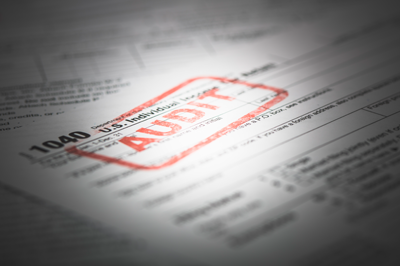In late 2020, the IRS announced that it will increase tax audits of small businesses by 50 percent in 2021. Here are several mistakes to avoid if you do get audited by Uncle Sam.
- Mistake: Missing income. A long history of investigating has led IRS auditors to focus on under-reported income. If you’re a business that handles cash, expect greater scrutiny from the IRS. The same is true if you generate miscellaneous income that’s reported to the IRS on 1099 forms. Be proactive by tracking and documenting all income from whatever source. Invoices, sales receipts, profit and loss statements, bank records—all can be used to substantiate income amounts.
- Mistake: Higher than normal business losses. Some small businesses struggle in the early years before becoming profitable. If your company’s bottom line never improves, the IRS may view your enterprise as a hobby and subsequently disallow certain deductions. As a general rule, you must earn a profit in three of the past five years to be considered a legitimate business.
 Mistake: Deductions lacking substantiation. Do you really use your home office exclusively for business? Does your company earn only $50,000 a year but claim charitable donations of $10,000? Do you write off auto expenses for your only car? The key to satisfying auditors is having clear and unequivocal documentation. They want source documents such as mileage logs that match the amount claimed on your tax return and clearly show a business purpose. If you can’t locate a specific record, look for alternative ways to support your tax return filings. In some cases, a vendor or landlord might have copies of pertinent records.
Mistake: Deductions lacking substantiation. Do you really use your home office exclusively for business? Does your company earn only $50,000 a year but claim charitable donations of $10,000? Do you write off auto expenses for your only car? The key to satisfying auditors is having clear and unequivocal documentation. They want source documents such as mileage logs that match the amount claimed on your tax return and clearly show a business purpose. If you can’t locate a specific record, look for alternative ways to support your tax return filings. In some cases, a vendor or landlord might have copies of pertinent records.- Mistake: No expense reports. If you use your credit card for business, create an expense report with account numbers and attach it to each statement. Then attach copies of the bills that support the charges. This is an easy place to blend in personal expenses with business expenses and auditors know it.
- Mistake: No separate books, bank accounts or statements. Never run personal expenses through business accounts and vice versa. Have separate bank accounts and credit cards. A sure sign of asking for trouble is not keeping the business separate from personal accounts and activities.
- Mistake: Treat the auditor as an enemy. Auditors have a job to do, and it’s in your best interest to make their task as painless as possible. Try to maintain an attitude of professional courtesy. If you’re called to their office, show up on time and dress professionally. If they come to your place of business, instruct staff to answer questions honestly and completely.
 Sleuthing your way through a tax audit by yourself is not the same as fixing a leaky faucet or changing your oil. Here are reasons you should seek professional help as soon as you receive a letter from the IRS:
Sleuthing your way through a tax audit by yourself is not the same as fixing a leaky faucet or changing your oil. Here are reasons you should seek professional help as soon as you receive a letter from the IRS:
- IRS auditors do this for a living — you don’t. Seasoned IRS agents have seen your situation many times and know the rules better than you. Even worse, they are under no obligation to teach you the rules. Just like a defendant needs the help of a lawyer in court, you need someone in your corner that knows your rights and understands the correct tax code to apply in correspondence with the IRS.
- Insufficient records will cost you. When selected for an audit, the IRS will typically make a written request for specific documents they want to see. The list may include receipts, bills, legal documents, loan agreements and other records. If you are missing something from the list, things get dicey. It may be possible to reconstruct some of your records, but you might have to rely on a good explanation to avoid additional taxes plus a possible 20 percent negligence penalty.
- Too much information can add audit risk. While most audits are limited in scope, the IRS agent has the authority to increase that scope based on what they find in their original analysis. That means that if they find a document or hear something you say that sounds suspicious, they can extend the audit to additional areas. Being prepared with the proper support and concise, smart answers to their questions is the best approach to limiting further audit risk.
- Missing an audit deadline can lead to trouble. When you receive the original audit request, it will include a response deadline (typically 30 days). If you miss the deadline, the IRS will change your tax return using their interpretation of findings, not yours. This typically means assessing new taxes, interest and penalties. If you wish your point of view to be heard — get help right away to prepare a plan and manage the IRS deadlines.
- Relying on an expert gives you peace of mind. Tax audits are never fun, but they don’t have to be pull-your-hair-out stressful. Together, you and your expert can map out a plan and take it step-by-step to ensure the best possible outcome. You’ll rest easy knowing your audit situation is being handled by someone with the proper expertise that also has your best interests in mind.
 According to the Association of Certified Fraud Examiners, nearly 30 percent of businesses are victims of payroll malfeasance, with small businesses twice as likely to be affected as large businesses. Here are four scary payroll fraud schemes you need to know:
According to the Association of Certified Fraud Examiners, nearly 30 percent of businesses are victims of payroll malfeasance, with small businesses twice as likely to be affected as large businesses. Here are four scary payroll fraud schemes you need to know:
- Ghost employees. A ghost employee does not exist anywhere except in your payroll system. Typically, someone with access to your payroll creates a fake employee and assigns direct deposit information to a dummy account so they can secretly transfer the money into their own bank account.
- Time thieves. Time stealing happens when employees add more time to their timecard than they actually worked. Sometimes multiple employees will team up to clock each other in earlier than when they arrive or later than when they depart for the day.
- Shape-shifting commissions. In an attempt to bump up a commission payment or attain a quota, sneaky sales employees may alter a sales contract to their benefit. A typical tactic used by a dishonest salesperson is to make a booked sale appear larger than it is and then slide a credit memo through the system in a later period. Companies with complicated commission calculations or weak controls in this area are the most vulnerable.
- External swindlers. A popular scam, known as phishing, starts with a fraudster impersonating a company executive through email or over the phone asking an employee with access to payroll data to wire money or provide sensitive information. These imposters can make the correspondence look very real by using company logos, signatures and email addresses.
Tips to combat payroll fraud
Being aware of the threats is a start, but you also need to know how to stop them. Here are some tips to reduce your company’s payroll fraud risk:
- Better internal controls. While most employees are trustworthy, giving too much control over your payroll to one person is not a good idea. Separating payroll duties and formalizing an approval process protects both your business and your employees.
- Review payroll records. Designate someone outside of the payroll-processing department to periodically review the payroll records. Have them review names, pay rates and verify that the total payroll matches what was withdrawn from the business bank account.
- Perform random internal audits. During an internal audit is when you can really get into the details to look for potential payroll fraud. You can do an in-depth review of the whole payroll system or select a random sample of dates and employees. Keep the timing of the audit under wraps to prevent giving someone the chance to cover up their misdeeds.
Managing your business payroll is a daunting task by itself, and actively protecting against fraud adds additional complexity.
 Is a worker an independent contractor or an employee? This seemingly simple question is often the contentious subject of IRS audits. As an employer, getting this wrong could cost you plenty in the way of Social Security, Medicare, and other employment-related taxes. Here is what you need to know.
Is a worker an independent contractor or an employee? This seemingly simple question is often the contentious subject of IRS audits. As an employer, getting this wrong could cost you plenty in the way of Social Security, Medicare, and other employment-related taxes. Here is what you need to know.
The basics
As the worker. If you are a contractor and not considered an employee, you must:
- Pay self-employment taxes (Social Security and Medicare-related taxes)
- Make estimated federal and state tax payments
- Handle your own benefits, insurance and bookkeeping
As the employer. You must ensure your employee versus independent contractor determination is correct. Getting this wrong in the eyes of the IRS can lead to:
- Payment and penalties related to Social Security and Medicare taxes
- Payment of possible overtime including penalties for a contractor reclassified as an employee
- Legal obligation to pay for benefits
Things to consider
When the IRS re-characterizes an independent contractor as an employee, they look at the business relationship between the employer and the worker. The IRS focuses on the degree of control exercised by the employer over the work done and they assess the worker’s independence. Here are some guidelines:
- The more the employer has the right to control the work (when, how and where the work is done), the more likely the worker is an employee
- The more the financial relationship is controlled by the employer, the more likely the relationship will be seen as an employee and not an independent contractor To clarify this, an independent contractor should have a contract, have multiple customers, invoice the company for work done, and handle financial matters in a professional manner
- The more businesslike the arrangement, the more likely you have an independent contractor relationship
While there are no hard-set rules, the more reasonable your basis for classification and the more consistently it is applied, the more likely an independent contractor classification will not be challenged.